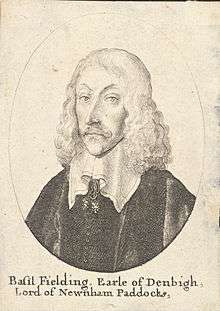Basil Feilding, 2nd Earl of Denbigh

Basil Feilding, 2nd Earl of Denbigh (c. 1608 – 28 November 1675) was the eldest son of William Feilding, 1st Earl of Denbigh.
Biography
Like his father, the son was educated at Emmanuel College, Cambridge.[1] He was summoned to the House of Lords as Baron Feilding in March 1629. After seeing military service in the Netherlands he was sent in 1634 by Charles I as ambassador to Venice, where he remained for five years.[2]
When the English Civil War broke out Feilding, unlike the other members of his family, ranged himself among the Parliamentarians, led a regiment of horse at the battle of Edgehill (his father being on the other side that day), and, having become Earl of Denbigh in April 1643, was made commander-in-chief of the Parliamentary army in Warwickshire and the neighbouring counties, and lord-lieutenant of Warwickshire.[2][3]
During the year 1644 he was fairly active in the field, but in some quarters he was distrusted and he resigned his command after the passing of the Self-denying Ordinance in April 1645. At the Treaty of Uxbridge in 1645 Denbigh was one of the commissioners appointed to treat with the king, and he undertook a similar duty at Carisbrooke in 1647. Clarendon relates how at Uxbridge, Denbigh declared privately that he regretted the position in which he found himself, and expressed his willingness to serve Charles I. He supported the New Model Army in its dispute with Long Parliament, but he would take no part in the regicide of Charles I.[2]
Under the government of the Commonwealth Denbigh was a member of the Council of State, but his loyalty to his former associates grew lukewarm, and gradually he came to be regarded as a royalist. In 1664 the earl was created Baron St Liz. Although four times married he left no issue when he died in 1675.[2]
His titles devolved on his nephew William Feilding, 3rd Earl of Denbigh (1640–1685), son and heir of his brother George (created Baron Feilding of Lecaghe, Viscount Callan and earl of Desmond), and the earldom of Desmond has been held by his descendants in conjunction with the earldom of Denbigh.[2]
See also
Notes
- ↑ "Feilding, Basil (FLDN621B)". A Cambridge Alumni Database. University of Cambridge.
- 1 2 3 4 5 Chisholm 1911, p. 17.
- ↑ "House of Lords Journal Volume 6: 12 June 1643". Journal of the House of Lords. 6. 1802 [1643]. pp. 89-94.
References
| Wikisource has the text of the 1885–1900 Dictionary of National Biography's article about Feilding, Basil. |
 This article incorporates text from a publication now in the public domain: Chisholm, Hugh, ed. (1911). "Denbigh, William Feilding, 1st Earl of". Encyclopædia Britannica. 8 (11th ed.). Cambridge University Press. p. 17.
This article incorporates text from a publication now in the public domain: Chisholm, Hugh, ed. (1911). "Denbigh, William Feilding, 1st Earl of". Encyclopædia Britannica. 8 (11th ed.). Cambridge University Press. p. 17.
| Honorary titles | ||
|---|---|---|
| Preceded by Interregnum |
Custos Rotulorum of Warwickshire 1660–1675 |
Succeeded by The Viscount Conway |
| Preceded by The Lord Loughborough |
Custos Rotulorum of Leicestershire 1667–1675 |
Succeeded by The Earl of Huntingdon |
| Peerage of England | ||
| Preceded by William Feilding |
Earl of Denbigh 1643–1675 |
Succeeded by William Feilding |